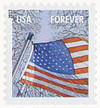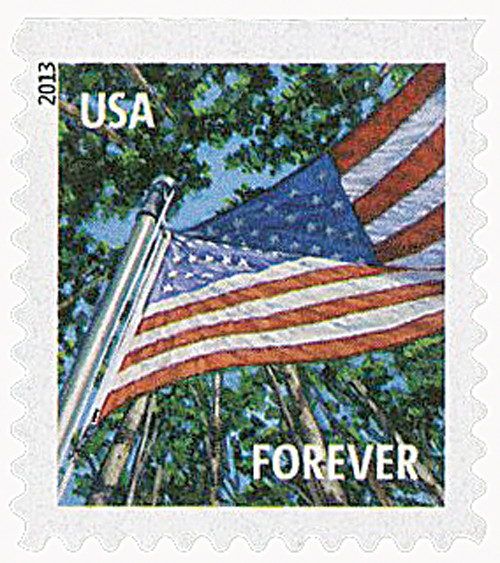
# 4781 - 2013 First-Class Forever Stamp - A Flag for All Seasons: Winter (Ashton Potter, booklet)
U.S. # 4781
2013 46¢ Winter
A Flag for All Seasons
The first time the United States experienced a World War holiday season was in 1917. With winter approaching, American men rushed to enlist in the “War to end all wars.” As Christmas neared, housewives flew flags and rationed meat and bread. Postmasters warned to mail soldiers’ packages early, and sold War Savings stamps. But few U.S. children felt the horrors of war. Instead, military toys, plus soldier and nurse uniforms, were at the top of many children’s lists for Santa that year.
While America’s youth eagerly awaited Christmas Eve, France was enduring some of the most intense fighting of the war. In New York City, kindergarten classes prepared Christmas stockings for French children. These gifts were distributed by the American Committee. The agency delivered approximately 500 stockings to 27 northern France villages that had been destroyed by bombing.
A committee member later recalled that a volunteer had been spotted by an older child as she hung stockings in a children’s shelter. The woman gestured for the boy to be quiet and continued working. On Christmas morning, the boy told the younger children about seeing Santa, wisely describing him as an “old, old man with a long white beard, and he was carrying an American flag.”
Laura Stutzman of Maryland created the patriotic gouache illustrations from her own photographs for the Flag for All Seasons stamps. Each of the four stamps in the issue pictures the U.S. flag, as seen from below, with the trees and sky representing the season.
Value: 46¢ 1-ounce first-class letter rate
Issued: May 17, 2013
First Day City: Rochester, NY
Type of Stamp: Definitive
Printed by: Ashton Potter (USA) Ltd.
Method: Offset printing with Microprint “USPS” in booklets of 20
Perforation: Serpentine Die Cut 11 ¼ X 10 ¾
Self-Adhesive
Quantity Printed: 250,000,000 stamps
Though America’s flag had previously been used many times as a secondary design element, it wasn’t the subject of a stamp until 1957 (U.S. #1094). Since the 1980s, it has become a regular practice to issue stamps picture the U.S. flag in a variety of scenes, including different locations and times of day.
U.S. # 4781
2013 46¢ Winter
A Flag for All Seasons
The first time the United States experienced a World War holiday season was in 1917. With winter approaching, American men rushed to enlist in the “War to end all wars.” As Christmas neared, housewives flew flags and rationed meat and bread. Postmasters warned to mail soldiers’ packages early, and sold War Savings stamps. But few U.S. children felt the horrors of war. Instead, military toys, plus soldier and nurse uniforms, were at the top of many children’s lists for Santa that year.
While America’s youth eagerly awaited Christmas Eve, France was enduring some of the most intense fighting of the war. In New York City, kindergarten classes prepared Christmas stockings for French children. These gifts were distributed by the American Committee. The agency delivered approximately 500 stockings to 27 northern France villages that had been destroyed by bombing.
A committee member later recalled that a volunteer had been spotted by an older child as she hung stockings in a children’s shelter. The woman gestured for the boy to be quiet and continued working. On Christmas morning, the boy told the younger children about seeing Santa, wisely describing him as an “old, old man with a long white beard, and he was carrying an American flag.”
Laura Stutzman of Maryland created the patriotic gouache illustrations from her own photographs for the Flag for All Seasons stamps. Each of the four stamps in the issue pictures the U.S. flag, as seen from below, with the trees and sky representing the season.
Value: 46¢ 1-ounce first-class letter rate
Issued: May 17, 2013
First Day City: Rochester, NY
Type of Stamp: Definitive
Printed by: Ashton Potter (USA) Ltd.
Method: Offset printing with Microprint “USPS” in booklets of 20
Perforation: Serpentine Die Cut 11 ¼ X 10 ¾
Self-Adhesive
Quantity Printed: 250,000,000 stamps
Though America’s flag had previously been used many times as a secondary design element, it wasn’t the subject of a stamp until 1957 (U.S. #1094). Since the 1980s, it has become a regular practice to issue stamps picture the U.S. flag in a variety of scenes, including different locations and times of day.










